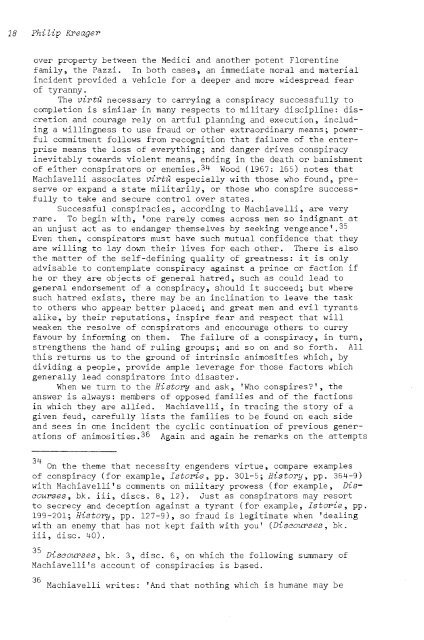CONTENTS NO.I - Institute of Social and Cultural Anthropology ...
CONTENTS NO.I - Institute of Social and Cultural Anthropology ...
CONTENTS NO.I - Institute of Social and Cultural Anthropology ...
You also want an ePaper? Increase the reach of your titles
YUMPU automatically turns print PDFs into web optimized ePapers that Google loves.
18 Phi lip Kreager<br />
over property between the Medici <strong>and</strong> another potent Florentine<br />
, the Pazzi. In both cases, an immediate moral <strong>and</strong> material<br />
incident provided a vehicle for a deeper <strong>and</strong> more widespread fear<br />
<strong>of</strong> tyranny.<br />
The virtu necessary to carrying a<br />
successfully to<br />
completion is similar in many respects to military discipline: discretion<br />
<strong>and</strong> courage on artful planning <strong>and</strong> execution, includa<br />
willingness to use fraud or other extraordinary means; powerful<br />
commitment follows from recognition that failure <strong>of</strong> the entermeans<br />
the loss <strong>of</strong> everything; <strong>and</strong> drives<br />
towards violent means, in the death or banishment<br />
<strong>of</strong> either conspirators or enemies. 34 Wood (1967: 165) notes that<br />
Machiavelli associates virtu especially with those who found, preserve<br />
or exp<strong>and</strong> a state militarily, or those who conspire successto<br />
take <strong>and</strong> secure control over states.<br />
Successful<br />
, according to Machiavelli, are very<br />
rare. To begin with, 'one rarely comes across men so at<br />
an unjust act as to endanger themselves by seeking vengeance' .35<br />
Even then,<br />
must have such mutual confidence that they<br />
are willing to lay down their lives for each other. There is also<br />
the matter <strong>of</strong> the self-defining <strong>of</strong> greatness: it is only<br />
advisable to<br />
a prince or faction if<br />
he or they are ects <strong>of</strong> general hatred, such as could lead to<br />
general endorsement <strong>of</strong> a conspiracy, should it succeed; but where<br />
such hatred exists, there may be an inclination to leave the task<br />
to others who appear better placed; <strong>and</strong> great men <strong>and</strong> evil tyrants<br />
alike, by their reputations, inspire fear <strong>and</strong> respect that will<br />
weaken the resolve <strong>of</strong> conspirators <strong>and</strong> encourage others to curry<br />
favour by on them. The failure <strong>of</strong> a conspiracy, in turn,<br />
strengthens the h<strong>and</strong> <strong>of</strong> ruling groups; <strong>and</strong> so on <strong>and</strong> so forth. All<br />
this returns us to the ground <strong>of</strong> intrinsic animosities which, by<br />
dividing a , provide ample leverage for those factors which<br />
generally lead conspirators into disaster.<br />
When we turn to the History <strong>and</strong> ask, 'Who ?', the<br />
answer is members <strong>of</strong> families <strong>and</strong> <strong>of</strong> the factions<br />
in which they are allied.<br />
, in tracing the story <strong>of</strong> a<br />
given feud, lists the families to be found on each side<br />
<strong>and</strong> sees in one incident the continuation <strong>of</strong> generations<br />
<strong>of</strong> animosities. 36 Again <strong>and</strong> again he remarks on the attempts<br />
34 On the theme that necessity<br />
<strong>of</strong> conspiracy (for example,<br />
with Machiavelli's comments<br />
courses, bk. iii, discs. 8,<br />
to secrecy <strong>and</strong> deception<br />
199-201; History, pp. 127-9<br />
with an enemy that has not<br />
iii, disc. 40).<br />
virtue, compare examples<br />
301-5; , pp. 364-9)<br />
prowess (for example, Dis-<br />
Just as<br />
may resort<br />
a tyrant (for , Istorie, pp.<br />
, so fraud is when 'dealing<br />
faith with you' (Discourses, bk.<br />
35 .<br />
D~scourses, bk. 3, disc. 6, on which the summary <strong>of</strong><br />
Machiavelli's account <strong>of</strong><br />
is based.<br />
36 Machiavelli writes: 'And that nothing which is humane may be

















